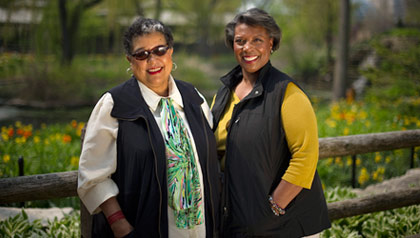Staying Fit


Regina Fraser and Pat Johnson, two erudite 60-somethings, turned their passion for world cultures and knack for reinvention into a new gig: hosting Grannies on Safari, their own travel show. They even sold their fur coats to raise seed money to launch the project.
The third season of their Grannies on Safari kicks off Sunday with travels to India (two shows), Peru (two shows), South Africa (Western Cape) and Zanzibar. The series airs on PBS stations nationwide and in 117 countries via UK Travel Channel. AARP is the exclusive sponsor, and selected the grannies to be the faces of AARP's 2011 "What's Next" campaign.
Both breast cancer survivors, Fraser and Johnson say their purpose is to inspire folks of all ages to seize the day and see the world.


AARP Membership— $12 for your first year when you sign up for Automatic Renewal
Get instant access to members-only products and hundreds of discounts, a free second membership, and a subscription to AARP the Magazine.
Pack tight, travel light
No matter where they go, the duo pack just one suitcase! Here's what's in it:
- Two pairs of slacks
- One skirt
- Five coordinating T-shirts
- Two jackets or sweaters that can be dressed up with a scarf
- Shoes: one pair of comfortable heels, one pair good walking shoes, one pair of walking shoes that slip on (like clogs)
- Toiletries in travel sizes, including LA Fresh travel wipes
- ScottEvest (lightweight, 22 pockets)
- Kindle
"People see these rotund, mature women climbing mountains and meeting extraordinary artists, and think, 'What am I doing sitting here?'" says Fraser. Proof of their ability to inspire is every viewer who has contacted them to ask, "Where are you going next?" and "Can I come along?"
The Chicago residents took a group to Egypt in January — arriving the day civil unrest erupted. True to form, the grannies seized the moment and ended up reporting on events for news operations back home. A woman who saw one segment got in touch, explaining, "I'm going to be 70 soon. I like to travel. Wherever you are going next, can I come with you?" Three weeks later, she joined them in South Africa.
Nothing could have been more satisfying for two women who see themselves as role models in pursuit of "discovery, knowledge and adventure."
"We are role models because we are women, we are role models because we are women of color, and role models because we are women of color who are articulate and who are not pulling each other's hair out," says Fraser. Johnson finds interesting the fact that their viewership includes a large number of 55-year-old white men.
Looking back, it's easy to see how their career paths led them to the partnership and friendship they now share. Their acquaintance started 30 years ago when their children attended the same school in Los Angeles. Their friendship grew roots after their careers reconnected them in Chicago in 1994. Johnson was a commissioner in Chicago's Cultural Affairs Department and Fraser a marketing executive for Chicago-based United Airlines, which donated tickets to support international exchanges.
"I was in awe of Pat, that she knew all these artists around the world and knew all these fascinating things," Fraser recalls. "If you take a dart and throw it at a map, she's been there. We became friends then because we have so many things in common."
That said, they are very different personalities.
Johnson has been to 76 countries. She's the cultural connection, the seeker of artists. She's also the stoic, the deadpan, the partner who would be happy to never again hear the question: "Do you know what you're eating?"

































































More From AARP
John Leguizamo, All Jokes Aside
The comedian talks about his dad, his marriage and Ghetto Klown, his one-man show now on Broadway.